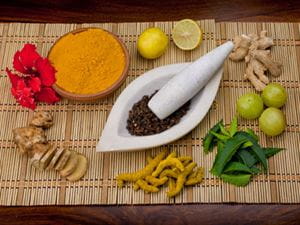
Now here’s something to think about, 90 percent of serotonin, the primary ingredient of anti-depressants, is naturally created in your gut.
Not in your brain, it’s in your intestines. Serotonin is then transformed by your liver into happiness cells that are carried on a parade of joy through your body. But your gut is only happy when you’re feeding it the right food.
Because most of us don’t think before we put food in our mouth, we’ve created a roaring industry for drug makers. It is estimated that every American spends around $500 a year on laxatives and fiber supplements. I can think of many more fun ways to spend $500, than on, er, feces.
And that’s before we add the billions spent on mood stabilizing meds. Many of our stomach problems start with us taking too many prescription tablets in the first place; constipation is a well-known side effect.
To create a daily parade of joy throughout your body, while losing weight, improving your skin, energy and concentration try Ayurveda. It is a 5,000 year-old Indian way of life practiced by modern sages like Deepak Chopra.
According to Ayurveda we have three doshas or personality types. If we eat according to our dosha we lose weight, get energy, and become happier. Vata personalities are energetic, have a small build, dry skin, and are light sleepers. Pitta have sharp minds and sometimes a temper. Kapha people tend to be heavier in build, have soft, oily skin and thick hair; this is the dosha happiest in front of the television.
If your dosha is unbalanced then a Kapha will gain weight, feel slow, and congested. A Vata imbalance sees indigestion, bloating and wind, while Pitta has heartburn, gastritis and diarrhea.
To practice Ayurveda you need to eat the right foods for your personality type, for example, Vata should mostly eat hot foods, while fiery Pitta’s should eat cooling foods. Spices are good for gentle Kapha.
And you need sufficient sleep; lights out by 10 pm and awake by 6 am. Enough sleep is essential for weight loss.
Before you clean your teeth, scrape your tongue with a special metal scraper, and rinse your nostrils with salt water from a Neti pot. The tongue scraper helps reduce addictions, and cleaning your nostrils helps reduce infections, it is particularly good for asthmatics.
After a shower and before bed, oil your body (sesame is best).
The first drink of the day is hot water with lemon to wake up fat-burning enzymes. If you’re puffy boil a handful of pearl barley in a quart of water until soft. Drain – keeping the water – to which you add honey and lemon before drinking. The barley can be added to your meals.
Ayurveda stresses regular meals with small portions. Also sip hot water with your meal and never cold drinks as this hampers digestion.
Make lunch your biggest meal of the day. Dinner should be small, light and vegetarian and never eaten after 8 pm. Cut back on dairy products and red meat because these slow weight loss. Ayurveda encourages you to use healing spices like cinnamon, which improves blood clotting, helps control blood sugar and stops yeast infections. Turmeric, as another example, helps prevent the build-up of plaque in the heart that can cause strokes, according to the University of Maryland. It also helps reduce inflammation, and is being studied because of reported beneficial properties in those with cancer.
Try a three-day detox. Chop an onion and fry in a little ghee (melted butter found in Indian shops and some supermarkets) or olive oil. When the onion is soft add half a cup of brown rice, add a teaspoon of lentils, a cup of vegetable stock and a pinch of turmeric. Simmer and eat when the rice is not too soft. If you want to zest it up, add a little cayenne pepper (good for the heart) or black pepper or chop in a little garlic, cilantro, green peppers, fresh chili, tomato, ginger or parsley. Eat this two to three times a day. If you want a bit of variety have fruit for one meal (not bananas) or oatmeal without milk, but with a little maple syrup and berries to sweeten.
Here’s to happiness, health, and more money in your pocket instead of the drug companies.
Charlene Smith is an award-winning journalist and an authorized biographer of Nelson Mandela. She lives and works in Cambridge, Massachusetts.

